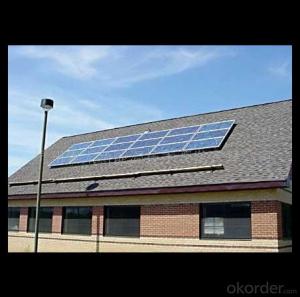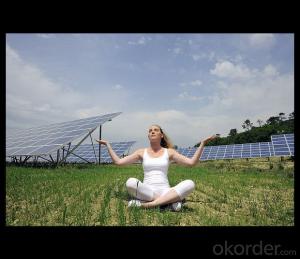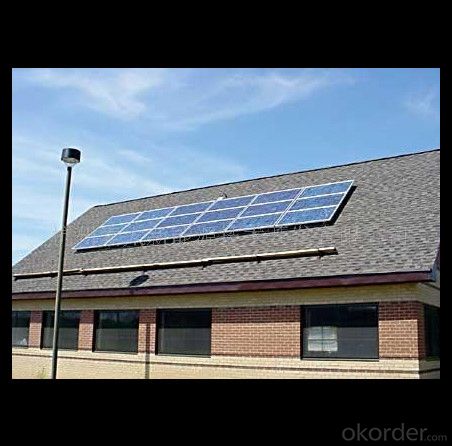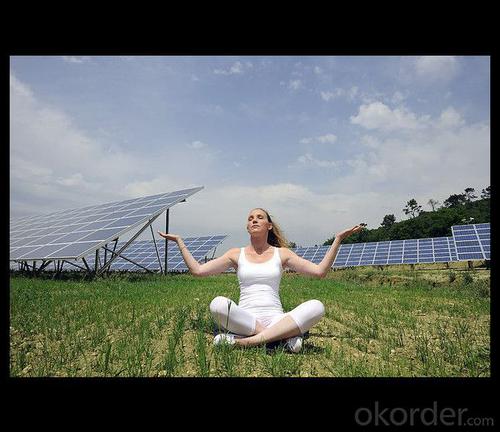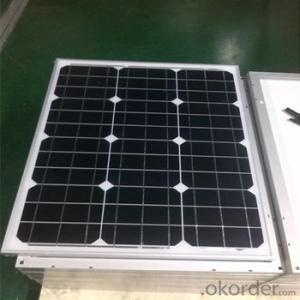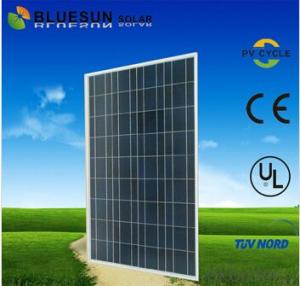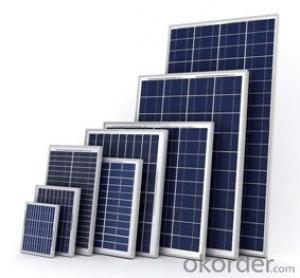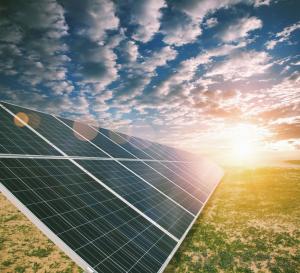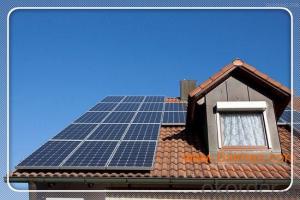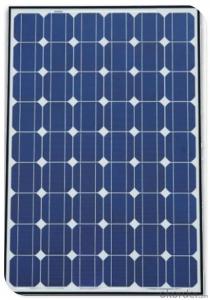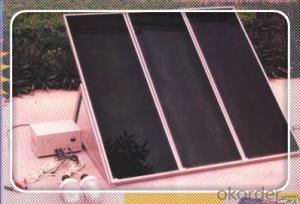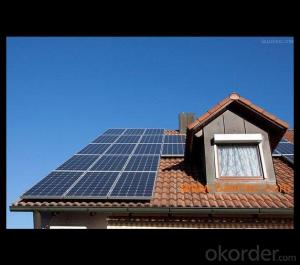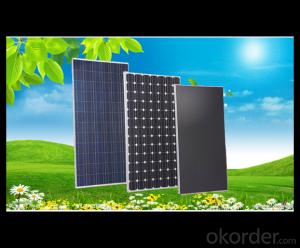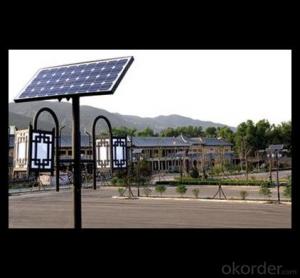Wall of Solar Panels:285w Direct Factory Sale Price 260-300watt Solar Panels
- Loading Port:
- China main port
- Payment Terms:
- TT OR LC
- Min Order Qty:
- 10000 watt
- Supply Capability:
- 100000 watt/month
OKorder Service Pledge
OKorder Financial Service
You Might Also Like
Specification
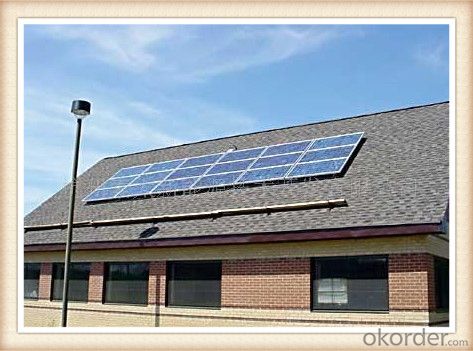
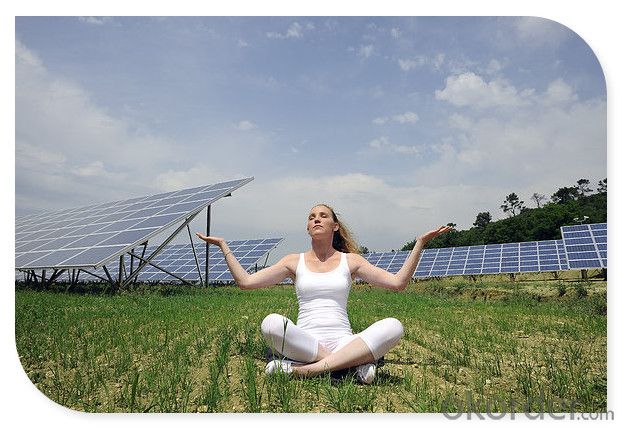
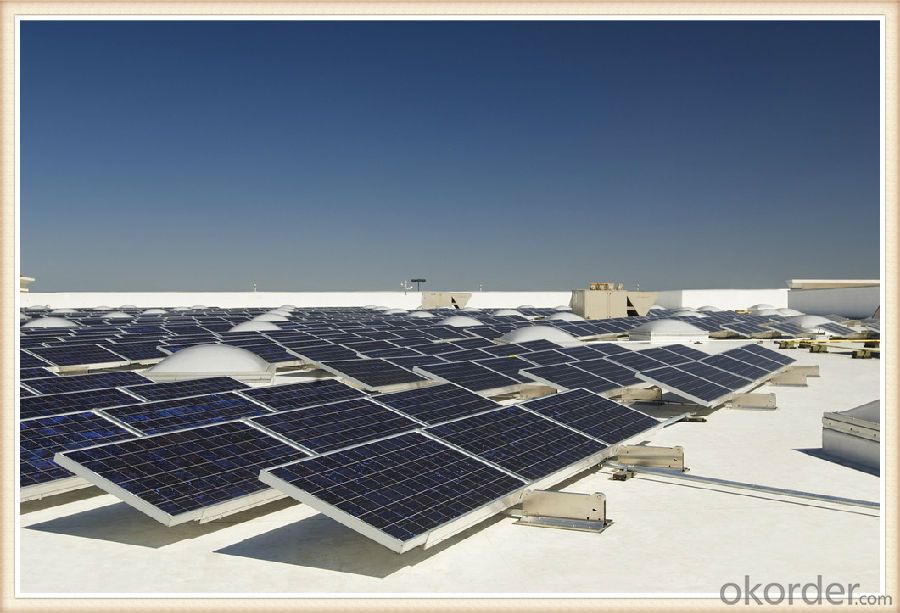
Solar Module Introduction
Solar modules use light energy (photons) from the sun to generate electricity through the photovoltaic effect. The majority of modules use wafer-based crystalline silicon cells or thin-film cells based on cadmium telluride or silicon. The structural (load carrying) member of a module can either be the top layer or the back layer. Cells must also be protected from mechanical damage and moisture. Most solar modules are rigid, but semi-flexible ones are available, based on thin-film cells. These early solar modules were first used in space in 1958.
Electrical connections are made in series to achieve a desired output voltage and/or in parallel to provide a desired current capability. The conducting wires that take the current off the modules may contain silver, copper or other non-magnetic conductive transition metals. The cells must be connected electrically to one another and to the rest of the system. Externally, popular terrestrial usage photovoltaic modules use MC3 (older) or MC4 connectors to facilitate easy weatherproof connections to the rest of the system.
Specification
Model Type | |
Peak Power-Pmax(W) | 5-200W |
Open Circuit Voltage-Voc(V) | 44.2 |
Maximum Power Voltage-Vmp(V) | 36 |
Short Circuit Current-Isc(A) | 5.4 |
Maximum Power Current-Imp(A) | 5 |
Maximum System Voltage | 1000V DC |
Maximum Series Fuse Rating | 10A |
Power Tolerance | -1~+3% |
Temperature Coefficients of Pmax | -0.45%/℃ |
Temperature Coefficients of Voc | -0.348%/℃ |
Temperature Coefficients of Isc | 0.031%/℃ |
Nominal Operating Cell Temperature | 44.5±2℃ |
Standard Testing Condition(STC) | Irradiance:1000W/m²;Temperature:25℃;AM=1.5 |
Qualification Test Parameters | |
Operating Temperature | -40℃~+85℃ |
Storage Temperature | -40℃~+85℃ |
Pressure Bearing | ≥5400Pascal/m² |
Wind Bearing | ≥5400Pascal/m² |
Mechanical Characteristics | |
Cell Size | Mono 125*125mm±0.5 |
No.of Cells | 72pcs(6*12) |
Dimension | 1580*808*40mm |
Weight | 15.5Kg |
Glass | 3.2mm High Transmission,Low Iron |
Frame | Anodized Aluminum Alloy |
Junction Box | IP65Rated |
Internal Diodes | 3 Bypass Diodes |
Cable | 1*4.0mm² Length 900mm |
Images
Packing & Shipping:
We have rich experience on how to pack the panels to make sure the safety on shipment when it arrives at the destination.
The normal size is packed by 25pcs/ carton / pallet. Paper carton for FCL shipping and wood carton for LCL shipping.
Features
1.High reliability with guaranteed -3% to +5% power output tolerance, ensuring return on investment
2.High conversion efficiency based on leading innovative photovoltaic technologies
3.Withstands high wind-pressure and snow load, and extreme temperature variations
4.Attractive appearanceUnique frame design, high mechanical strength, and easy Installation
Warranty:
For c-Si panel: 25years output warranty for no less than 80% of performance, 10 years output warranty for no less than 90% of performance. Free from material and workmanship defects within 5 years.
For a-Si panel: 20 years output warranty for no less than 80% of performance, 10 years output warranty for no less than 90% of performance. Free from material and workmanship defects within 2 years.
•100% product quality protection
•100% on-time shipment protection
•100% payment protection for your covered amount
FAQ:
(1)What price for each watt?
It depends on the quantity, delivery date and payment terms.
(2)What is your size for each module? Can you tell me the Parameter of your module?
We have different series of panels in different output, both c-Si and a-Si. Please take the specification sheet for your reference.
(3)Can you provide the peripheral products of the solar panels, such as the battery, controller, and inverter? If so, can you tell me how do they match each other?
Actually we are only manufacturer of solar panels, but we could try to source them for you in China if you need. We could provide you an optimal system design to instruct you how to install.
(4)Do you have the CE, TUV, UL Certification?
We’ve already passed all the tests, and any certificate is available.
(5)Have you ever sold your products to companies in my country?
Of course, we have customers in all general PV markets, but I think we should expand our market share along with the market growth.
(6)When did your company set up? You are a new company, how can I believe your quality?
We entered into Solar PV industry in 2005, now we have several plants in manufacturing of a-Si and c-Si panels, and our capacity is 220MW per year. Till now we have already passed all the tests by authorized laboratories, e.g. TUV, VDE, UL.
(7)Can you help us install the module if we cooperate with you?
We haven’t entered into installation sector, but we have the plan in near future.
(8) How do you pack your products?
We have rich experience on how to pack the panels to make sure the safety on shipment when it arrives at the destination.
(9) Can you do OEM for us?
Yes, we can.
(10)Can we visit your factory?
Surely, I will arrange the trip basing on your business schedule.
- Q: My hubby and I are waiting to move in to our camper but have to figure out how many solar panels, batteries, etc. to get. I can't find the info per appliance for Watts and amps, but does anyone have a good, general idea of how many Watts it'd take to run the whole shabang? It's a 999, 25-foot Sportsmen tag-a-long, if that helps..It's got the following, and we'd like to run the propane things off of electric:*Refrigerator/freezer*Microwave*Oven/stove*AC/Heat*Will have a tv, phone chargers, laptop charger, but those will be unplugged when not in useThanks so much! It's such a headache.. You get SO MUCH different info from different places.. OI..
- Running an oven or stove on solar is not a practicality; too much power is needed, use gas. Ditto, heating using solar electricity is not a practicality, and AC would also be asking a lot. The other things, within limits, might be do-able. You'll be needing as many solar panels as you can fit on. If I was you I'd consult a solar installer about how big your battery bank should be once you have decided how many Watts of panels you can put on.
- Q: Can solar panels be installed on mining or extraction sites?
- Yes, solar panels can be installed on mining or extraction sites. In fact, installing solar panels in these areas can be beneficial as it provides a renewable and sustainable source of energy to power mining operations. Not only does it reduce reliance on fossil fuels, but it also helps offset carbon emissions associated with mining activities. Additionally, solar panels can help lower energy costs and contribute to a more environmentally friendly mining industry.
- Q: Is there a cheaper way on how to make your own solar panels ? Can someone share their real life experience ? Thank you.
- On my website you can read my story of how my dad made solar panels at home for a little over $200, and now he pays nothing to the electric company.
- Q: Can solar panels be used for heating water?
- Yes, solar panels can be used for heating water. Solar thermal systems or solar water heaters use solar energy to heat water by capturing sunlight and converting it into heat energy. This heat is then transferred to a fluid, which is used to heat the water in a storage tank. This sustainable and cost-effective method can be used for residential, commercial, and industrial water heating purposes.
- Q: Can solar panels be installed on a parking lot or carport?
- Yes, solar panels can be installed on a parking lot or carport. This type of installation is commonly known as solar carports. Solar carports provide shade for parked vehicles while generating clean and renewable energy. They are becoming increasingly popular as they offer dual benefits of generating electricity and providing shelter.
- Q: Can solar panels be installed on warehouses?
- Yes, solar panels can be installed on warehouses. In fact, warehouses are ideal locations for solar panel installations due to their large roof spaces that can accommodate a significant number of panels. The ample sunlight exposure and lack of shading make warehouses a perfect fit for harnessing solar energy. Additionally, solar panels on warehouses can help reduce electricity costs and contribute to a greener, more sustainable energy source.
- Q: Can solar panels be installed on community centers or libraries?
- Yes, solar panels can be installed on community centers or libraries. In fact, community centers and libraries are often ideal locations for solar panel installations due to their large rooftops and high energy consumption. Installing solar panels on these buildings can help reduce electricity costs, promote renewable energy use, and contribute to a more sustainable and environmentally friendly community.
- Q: Okay, me and my friends are going to fix up an old trailer that's out in the woods, we want something to be able to run small electric appliances off of, but it's to far to run power to. How can we make a good but cheap homemade solar panel that we could plug things into? The trailer is in more of a field so it gets plenty of sunlight! Thanks for any help! :)
- Solar panel cannot be home made with household material. It was a high tech product. You need to buy them in market. To suppose electricity for a trailer home, solar system becomes very expensive . A t least few thousands dollar to buy solar panels, storage battery bank, DC to AC inverter, heavy gauge wiring and hardware.
- Q: Where can I buy solar panels other than online in Charlotte, NC?
- theres a sparkling technology of solor voltaic cellular popping out in 2009 which will diliver 40% greater potential than the regular living house use cellular panels, they'd cost as much as they do on the instant purchase at 40% greater its properly actual worth the wait, plus the advancements being made in case you do diside to make investments they are going to be obsolite in 5-0 years yet by potential of then the device could have paid for them selves, which in time they do. and in case you get a slow wind, like we do right here in northen indiana, get a wind turbine rated at 7k in line with day
- Q: i really need to know howbecause im building a solar powered car for science fair :]thank you!
- Hehe, if you want to build your own solar panel that looks like what you see on buildings, etc, you will probably need to be a multi-millionaire. Here is a quote from the first link in my sources list: The high-efficiency solar cells you can buy at Radio Shack and other stores are made from highly processed silicon, and require huge factories, high temperatures, vacuum equipment, and lots of money. But fortunately for you, there is a cheap way to make a solar panel yourself (see first link). I love the scitoys website, but I am not quite familiar with this particular experiment. It looks like a science fair project in itself! It also doesn't appear to put out nearly enough power to run even a small solar car. What I would recommend is buying a compact solar panel from Radio Shack or some other electronics store that you may know of. Type in solar in to the Radio Shack search box. The first item on the list may be useful to you (the solar panel battery combo). I am just guessing, though, since I don't know any of your requirements (voltage output, power output, size, etc). Also, buyer beware. This particular product has a pretty bad customer review... but then again, I find that people are more inclined to leave a bad review than a good one. Good luck... -Ubi
Send your message to us
Wall of Solar Panels:285w Direct Factory Sale Price 260-300watt Solar Panels
- Loading Port:
- China main port
- Payment Terms:
- TT OR LC
- Min Order Qty:
- 10000 watt
- Supply Capability:
- 100000 watt/month
OKorder Service Pledge
OKorder Financial Service
Similar products
Hot products
Hot Searches
Related keywords
